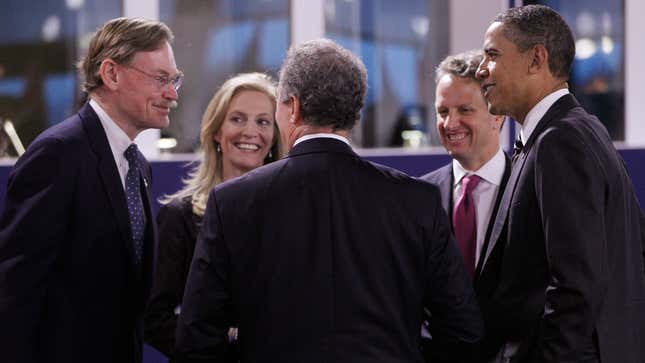
She may not be a household name, but Lael Brainard is the US Treasury Undersecretary for International Affairs. Her job is to manage America’s financial relations with the world’s largest economies for her boss, Treasury Secretary Tim Geithner. It’s an important policymaking role, given the integration of the global economy. It’s also important in terms of precedent: Geithner and his predecessor as a Treasury Secretary in a Democratic administration, Larry Summers, also held the job. But even though Geithner will step down in the months ahead, few people are mooting Brainard as a potential succesor.
When the European financial crisis kicked off in late 2009, Brainard was at the center of the US response, connecting with her counterparts in European financial ministries to urge faster action. While the crisis response has been muddled, Brainard’s support for a comprehensive early solution seems prescient today. When I profiled her work the next year (hoping, I’ll admit, to catch a star on the rise) she was credited with developing the tools the IMF used during the 2008 crisis and convincing China to allow its currency to appreciate in 2010.
Brainard has the résumé and the experience to be Treasury Secretary, and arguably her particular focus on international economics is critical at the moment. But her name’s not being bandied around for the job as much as others. The top candidate in the expectations game is Jack Lew, the White House chief of staff and budget expert. Erskine Bowles, another former White House chief of staff and budget maven, is under consideration, while the investor Warren Buffet wants JP Morgan chief Jamie Dimon to take over—not likely. Expect someone with more Washington than Wall Street connections; a better dark horse might be Facebook COO Sheryl Sandberg, another former Treasury official.
So why not Brainard? Here are some reasons why her name might not have come up—and why it should.
– It’s easy to get distracted by domestic priorities. The prevailing wisdom is that fiscal challenges will take up most of the Treasury Secretary’s time in the next two years, as budget talks and tax reform dominate discussion. This is the best reason to tap someone with more domestic experience. On the other hand: Geithner wasn’t known as a budget wonk, either, and he is now the administration’s point man on talks with the Republicans. Also, after years of monitoring fiscal consolidation in countries facing financial crises, Brainard probably knows a thing or two about reducing debt, and once the fiscal cliff is past, the euro crisis and China’s transition are more pressing concerns.
– She’s a woman. There’s never been a female Treasury Secretary; in fact, Brainard is herself the highest-ranked woman in the department’s history. While outright gender discrimination probably isn’t the culprit, none of the President’s top economic advisers is a woman, and previous advisers like economist Christina Romer and Federal Deposit Insurance Corporation Chair Sheila Blair reportedly clashed with the president’s inner circle. On the other hand: She’s a woman, and there will be pressure on Obama to ensure his economic team reflects the diversity of his supporters.
– She’s too much like Tim. Like Geithner, Brainard isn’t of the financial sector, but her time as a financial diplomat has kept her familiar with Wall Street. That’s a no-no with some in Obama’s political base, and they share a similarly pragmatic worldview when it comes to fighting crises and making deals: “Plan beats no plan,” in Geithner’s oft-repeated words. On the other hand: Despite early stumbles, and being responsible for the controversial rescue of the banking sector, Geithner is one of the most effective and long-standing cabinet members on Obama’s team. Maybe Brainard can be change and more of the same.